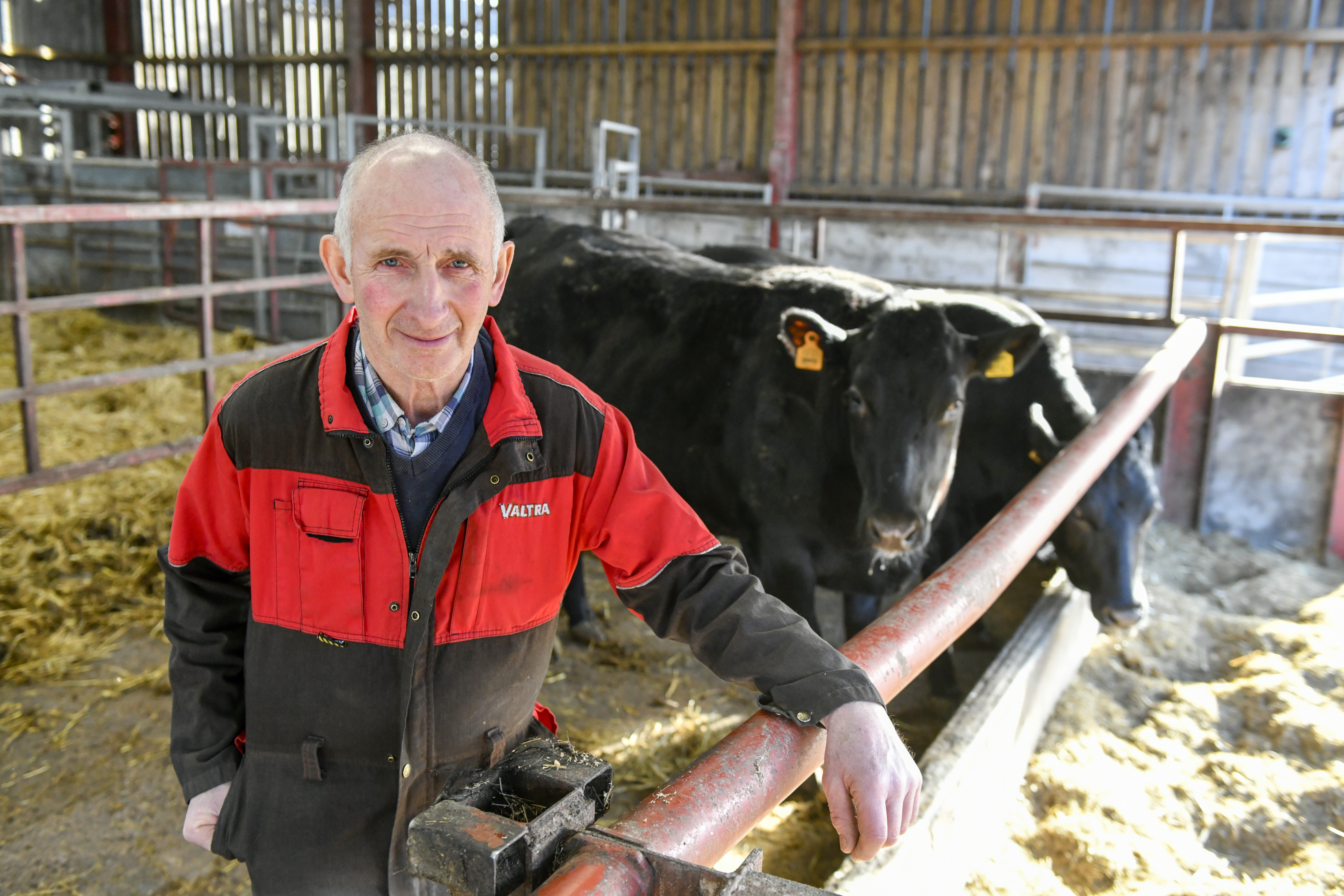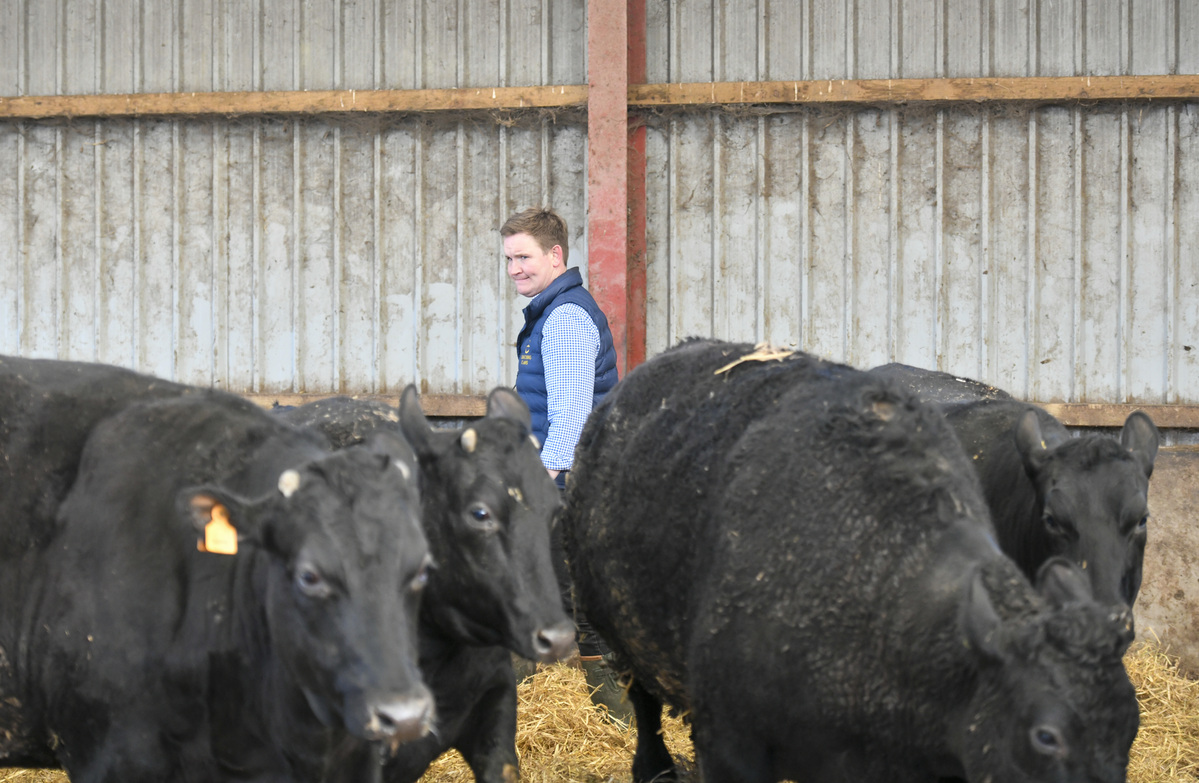They are, however, given a stiff brushing every day to help prevent stress and adrenaline building up in their bodies which will have an adverse effect on the tenderness of the meat, and they have a special nutritionist to advise on their diet.
Alan Dickinson and son Chris have been raising Wagyu beef cattle on the family farm at North Netherscales, between Penrith and Carlisle, for some time now and say attention to detail pays off.
"We developed taking on the Wagyu cows over some years, it was a new breed in the UK, and this has been built up to around 120 cows on farm, replacing our more traditional beef breeds," said Chris, 35.
"The Wagyu cows arrive on our farm between 18 and 21 months old from local grass-fed farms, which means we don't have a large dent on the environment in transporting them from farm to farm," added Chris, who also runs his own goat meat enterprise.
A director with the British Wagyu Breeders Association, Chris uses his business development, innovation, and creativity in promoting the breed, particularly in the area of product development and marketing.
Chris and his dad Alan are part of the Warrendale Wagyu family, a Yorkshire-based company, established in July 2017.
The company work with farmers, many in Cumbria, to produce their unique Wagyu beef using their own fullblood Wagyu genetics crossed with dairy cows to produce a Wagyu Cross, also known as an F1 Wagyu. They also have a fullblood Wagyu herd at Warrendale.
Wagyu is a Japanese breed of cattle where the 'Wa' means Japanese and 'Gyu' means cow. The breed was confined to Japan until the 1970s since it was regarded as a national treasure and protected by export from the Japanese government. The first bloodlines of Wagyu beef came out of Japan to America in the 1970s with Australia following in the 1990s. The breed is now readily available all over the world.
“This is high-end quality beef and much sought after. There are around 350 to 400 partner farmers and about 20,000 animals, with over 100 farmers coming from Cumbria. Warrendale have a contract to supply Wagyu to Waitrose and Aldi. The latter sees Wagyu beef disappear off the shelves only hours after it is put out,” said Chris.

Alan Dickinson
The Dickinson family ensure that their Wagyu cows have the finest quality food, which is developed with Warrendale Wagyu's nutritionist. "It is made up of our own crushed barley, straw, rape meal, beet pulp, and extra minerals, meaning the cows have a fantastic blend and balance of everything they need to produce a high-quality product," said Chris.
The family say they love the Wagyu's temperament.
Production Director at Warrendale Wagyu is Jamie Brownrigg who is a Cumbrian farmer. He also grows Wagyu for Warrendale at the home farm.
Jamie said: “Our love for Wagyu beef started a long time ago after a visit to Australia where the unique quality of Wagyu was experienced. It has taken many years to build this passion for great tasting beef into the business we operate today.
"It’s only now that with the help of all of our farmers, from breeders to finishers that we have the Wagyu beef for all of our customers to enjoy. Rearing our Wagyu cattle is a very intricate process with a lot of attention to detail at every stage."
Wagyu is renowned for its eating quality, which consists of flavour, tenderness, and succulence. The breed is famous for its marbling, this is the fat dispersed within the muscle. This effectively melts through the cooking process to release more flavour and succulence.
There are different grades of marbling, this depends on a number of factors including the breed, feed, and time on different feeds.
Jamie added: "At Warrendale, our aim is to work with our UK climate and farmers to produce Wagyu predominantly outdoor, grass fed with a time on grain at the end to help increase the marbling levels and meat quality.
"We are not targeting the extreme marbling often seen in Japanese or imported Wagyu that has been fed on grain for a long time. Marbling is an important part of the story on quality, there are also a number of other factors that affect the quality of meat such as feed, age, welfare and how we treat the meat once the animal is processed.
"We age all our beef on the bone for at least one week, it is also aitch bone hung to improve tenderness. We then continue to age the meat once it is de-boned."
Wagyu beef has a genetic predisposition to contain a higher percentage of omega-3 and omega-6 fatty acids than other beef breeds, meaning it has a better ratio of monounsaturated fats to saturated fats.
These monounsaturated fats can melt at room temperature, in fact at just 77F (25C), a lower temperature than any other beef.
The aim of Warrendale Wagyu is to produce consistent, grass-reared animals until 22 months that are then finished on grain by about 25 to 28 months.
The system works on a transparent price matrix based on the growth of the animals, regardless of market price. Farmers cover all costs and are paid on a price per kilo basis.
Dairy cross Wagyu was the breed of choice because of the consistency of the product and the fat-to-meat ratio, explains Jamie.
"The dairy herd has a tight genetics pool compared with beef breeds, and they are renowned for growing frame. The Holstein also helps slow down the maturity and has a natural marbling ability that complements the Wagyu," he says.
Farmers can be involved in as many parts of the supply chain as they wish, but generally dairy farmers are supplied with Waygu semen, then sell the subsequent calves to rearers at two to four weeks old, although some keep them through this stage.
At three to four months of age, the calves are sold to growers, who keep them until they are about 19 to 21 months, when they go to finishers.
The finished cattle are sold back to Warrendale with farmers paid on a deadweight basis.
"We try to keep everything local and then connect dairy farmers with the local rearers and the same with growers and finishers. We have created local hubs, with the largest in Cumbria, Lancashire, Yorkshire, and Shropshire," said Jamie.
"The growth in the breed is demonstrated in the British figures, Wagyu numbers are up by a third over the past year," said Chris.
In a bid to prevent food fraud, Warrendale Wagyu has introduced DNA and EID tags.
"There has been some false selling of the meat, says Chris. "That is why the DNA tag is a compulsory measure for farmers," he added.
"The finished product is now sold online, in restaurants and shops and it has been wonderful to see our hard work in a final product on the shelves and to know it was our input and attention to detail that means such a high-quality product can be accessed by all," added Alan.
